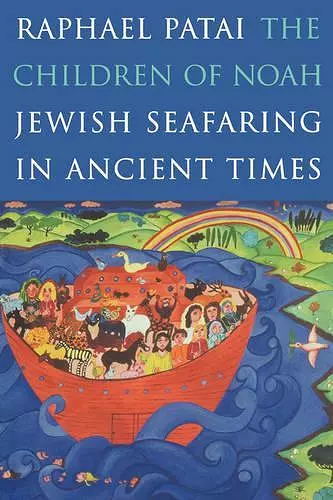The Children of Noah
Jewish Seafaring in Ancient Times
Format:Paperback
Publisher:Princeton University Press
Published:5th Dec '99
Currently unavailable, and unfortunately no date known when it will be back

This book delves into the rich history of Jewish seafaring from biblical times to the Diaspora, highlighting its cultural significance. The Children of Noah offers a unique perspective on maritime traditions.
In The Children of Noah, the late Raphael Patai invites readers to explore the captivating world of Jewish seafaring, tracing its roots from the biblical story of Noah through the Diaspora of late antiquity. This work masterfully intertwines Biblical narratives, Talmudic traditions, and Midrash literature to illuminate the lives of ancient mariners. Patai's pioneering scholarship reveals the profound significance of the sea in Jewish history, illustrating how it shaped the experiences of those who ventured upon it.
Patai's exploration begins with Genesis, where he profiles Noah as the archetypal shipbuilder and seafarer. The sea emerges as a powerful symbol of divine influence, and Patai reflects on its role in early legends and tales. He provides a comprehensive view of the practical aspects of Jewish seafaring, highlighting how sailors developed their own culture while adhering to rabbinical laws. This book not only showcases the challenges faced by Jewish sailors but also their innovative solutions, such as obtaining special permissions to perform necessary tasks on the Sabbath.
The Children of Noah stands as a testament to Patai's extensive research and storytelling prowess. It serves as both a vivid history of a largely overlooked facet of Jewish culture and a valuable resource for further academic inquiry. This engaging work appeals to scholars and general readers alike, making it a significant contribution to our understanding of the ancient world and Jewish maritime traditions.
"It's not everyone who can spend a lifetime with the kinds of questions Patai asks... But almost everyone will find fascinating the answers Patai provides... Practical rather than theoretical, empirical rather than imperious, durable rather than glamorous ... a vessel with spirit, a freighter of mysteries."--Laurance Wieder, The Weekly Standard "Patai takes the bare bones of what there is in the Bible and, through scholarship and intellect, builds up a lively picture of life at sea... This book will stand as a final and fitting monument to Patai's lifetime of scholarship and research into ancient Jewish history and culture."--David Brauner, Jerusalem Post "An artful weaving together of biblical tales, Talmudic legends, and Midrash literature, The Children of Noah: Jewish Seafaring in Ancient Times chronicles the amphibious adventures of the ancient Israelites."--Publishers Weekly "A useful source book... [I]f you're Jewish and love the sea ... It's not an account you would want to miss."--Hillel Halkin, Forward "A lively and fascinating narrative that makes a full exposition of the subject available to students and advanced readers for the first time."--Library Journal
ISBN: 9780691009681
Dimensions: unknown
Weight: 369g
224 pages